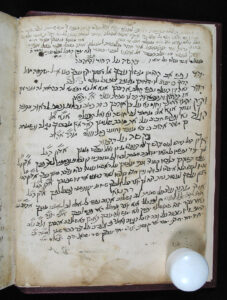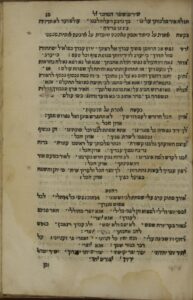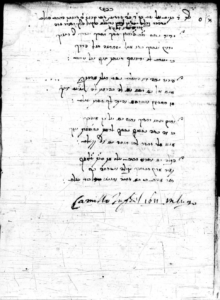| Source (Hebrew) | Translation (Arabic) |
|---|---|
יְדִיד נֶפֶשׁ אָב הָרַחֲמָן, מְשֹׁךְ עַבְדָּךְ אֶל רְצוֹנָךְ, יָרוּץ עַבְדָּךְ כְּמוֹ אַיָּל, יִשְׁתַּחֲוֶה מוּל הֲדָרָךְ, כִּי יֶעֱרַב לוֹ יְדִידוּתָךְ, מִנֹּפֶת צוּף וְכָל טַעַם. |
أبت الرحيم حبيب نفسي سيدي قد عبدك المسكين حسب ؟مرامكا؟ هو مسرع مثل الغزال أخالقي بتخشع يجثو أمام جلالكا والذ لي من كل شهر حبكم والذ طعم ذقته بودادكا |
הָדוּר נָאֶה זִיו הָעוֹלָם, נַפְשִׁי חוֹלַת אַהֲבָתָךְ, אָנָּא אֵל נָא רְפָא נָא לָהּ, בְּהַרְאוֹת לָהּ נֹעַם זִיוָךְ, אָז תִּתְחַזֵּק וְתִתְרַפֵּא, וְהָיְתָה לָךְ שִׁפְחַת עוֹלָם. |
لك يا جليلاً يا بهاء الكون نف سي في السقام من الهيام بحبكا يا شافي المرضى أشفها يا ربنا أظهر اليها نعمة من نوركا حتى تقوى ثم تحظى بالشفا وتدوم خادمة أليك بظلكا |
וָתִיק יֶהֱמוּ רַחֲמֶיךָ, וְחוּסָה נָא עַל עַם אֲהוּבָךְ, כִּי זֶה כַמֶּה נִכְסֹף נִכְסַף, לִרְאוֹת בְּתִפְאֶרֶת עֻזָּךְ, אָנָּא אֵלִי חֶמְדַּת לִבִּי, וְחוּסָה נָא וְאַל תִּתְעַלָּם. |
لتظل رحمتك الجزيلة بينا أوثيق عهد وارأفن بشعبكا فاليك كم قد تق ياباري الورى ليراك في أعلى السهأ بعزكا يا بهجة القلب أن تشفقن واسرع ولا تغاضى عن أولادكا |
הִגָּלֶה נָא וּפְרֹשׂ חָבִיב, עָלֵינוּ אֶת סֻכַּת שְׁלוֹמֶךָ תָּאִיר אֶרֶץ מִכְּבוֹדָךְ, נָגִילָה וְנִשְׂמְחָה בָּךְ, מַהֵר אָהוּב כִּי בָא מוֹעֵד, וְחָנֵּנִוּ כִּימֵי עוֹלָם. |
ها أنت محبوب الورى فظهر لنا وابسط علي مظلة من سلمكا فلرض تشرق من بهاك مضيئة والكل جذلان ومبتهج بكا فالوقت آن فأسرعن أجبيبنا واشفق علي كما مضى بحنوكا |
“Yedid Nefesh” is a piyyut first published in the Sefer Haḥaredim (1588) of Rabbi Elazar Moshe Azikri (1533-1600). The authorship of the piyyut is not completely certain. A version of the piyyut “with noteworthy text, spelling and pointing” may be found on folio 146 (verso) of Samuel b. David b. Solomon’s Commentary On the Book of Numbers (ca. 1437 CE).[1] Find Stefan C. Reif’s The Hebrew Manuscripts at Cambridge University Libraries: A Description and Introduction Cambridge: Cambridge University Press, 1997, page 93. Reif attributes Yedid Nefesh to Azkiri. Presumably, the text must have been added to the 15th century manuscript sometime after the publication of Sefer Haḥaredim. It would be very nice to see a digitized image of this manuscript page from the CUL collection! Yedid Nefesh also appears in Moscow – Russian State Library, Ms. Guenzburg 320 as the last of “a polyglot of at least 24 different items written in different stages” (find Dr. Ezra Chwat, גילוי מילתא בעלמא Giluy Milta B’alma). Yedid Nefesh appears there under the following headline: ד’ בתים של שם בן ד’ ב”ה ששמענו מפי קדוש מכבוד החכם השלם מהר”ר גדליה בן לגאון המושלם המקובל [הא]לקי כמהר”ר משה קורדוברו זצק”ל”. Ezra Chwat: “This doesn’t necessarily qualify that Gedalia Cordovero (1562–1625, son of Moshe Cordovero, ReMaK), is the author. To be precise, it attributes to him the oral transmission.” Meir Benayahu in Yosef Behiri, 1991, p.544, “asserts that this witness must have heard the poem from Gedalia Cordevero after his descent [from Safed] to Italy in 1583. This would be a full five years before Ḥaredim was written (and 17 years before [it was] published). Having been transmitted orally for some time might explain some of the variants. In any case Gedalia Cordevero and Elazar Azkari are likely to have been well acquainted.” The piyyut has appeared with a number of variations in various siddurim.
This is a faithful transcription of Yedid Nefesh translated into Arabic from סדור פרחי سدور فرحي Siddur Farḥi (nusaḥ Sefaradi, minhag Egypt 1913, 1917) by Hillel Farḥi (1868-1940). (A copy of Siddur Farhi can be ordered from the Farḥi Foundation here.) Transcription of the Arabic was made by Wikisource contributor Avigdor24, here. Please help to proofread and improve this transcription. Join us in the digital transcription of Siddur Farḥi on Hebrew Wikisource.
Source

Yedid Nefesh (JTSA MS3541, fol.5v) yedid nefesh – sefer haḥaredim 43a (Venice 1597)

Notes
| 1 | Find Stefan C. Reif’s The Hebrew Manuscripts at Cambridge University Libraries: A Description and Introduction Cambridge: Cambridge University Press, 1997, page 93. Reif attributes Yedid Nefesh to Azkiri. Presumably, the text must have been added to the 15th century manuscript sometime after the publication of Sefer Haḥaredim. It would be very nice to see a digitized image of this manuscript page from the CUL collection! |
|---|

“יְדִיד נֶפֶשׁ | Yedid Nefesh, a piyyut transmitted by Elazar ben Moshe Azikri (ca. 16th c.) Arabic translation by Hillel Farḥi (1913)” is shared through the Open Siddur Project with a Creative Commons Public Domain Dedication 1.0 Universal license.










Leave a Reply